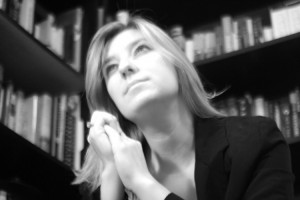In C.S. Lewis’s An Experiment on Criticism (2010/1961), he writes,
Literary experience heals the wound, without undermining the privilege, of individuality . . . But in reading great literature I become a thousand men and yet remain myself. Like the night sky in the Greek poem, I see with a myriad eyes, but it is still I who see. Here, as in worship, in love, in moral action, and in knowing, I transcend myself; and am never more myself than when I do.
Growing up an only child, I immersed myself in the world of fiction. I began rather benignly reading Archie comics and Nancy Drew mysteries. There is something marvelous about getting lost in a book. I stood innocently behind Nancy as she ascended the winding staircase, hearing the steps groan beneath the weight of her foot, waiting with bated breath in the pregnant silence of a strange house suffering from neglect. What awaited her at the top of those stairs? A shadowy figure? A cryptic message scrawled across a mirror?
The privilege of reading is that you can escape, if but briefly, to another world. You can “see with a myriad eyes and yet remain yourself” for a few moments. As Lewis extrapolates further in An Experiment on Criticism, escaping is not an unhealthy practice as long as you suppress the urge to blur reality and fiction. Fiction can certainly teach us many truths about reality, but fiction can also poison reality, creating false perspectives which rob us of the pleasure, what Lewis would call Joy, life can offer us. There is a grand exchange between an author and a reader. It has existed for centuries, fueled by the delight and passion of those who insatiably devour books to feed a mind or engage an imagination.
Alan Jacobs recently argued in his The Pleasures of Reading in an Age of Distraction that, contrary to popular belief, technology has positively impacted literacy. Inventions such as the Kindle and Nook have, for both casual readers and erudite scholars, reinvented reading. Many reluctant readers purchase e-readers to simply maintain a presence in the technological community, to keep abreast of what their friends are “downloading”; it’s keeping up with the Joneses for the twenty-first century.
So as new generations get lost in the literature of the age (or of ages past), let us be thankful that they are reading at all, amid a plethora of other distractions. Be it the antics of Archie and his two girlfriends, Harry Potter wrestling with his arch nemesis, or pale vampires who sparkle, be ye thankful. That initial interest for reading may very well mature into an appreciation for more diverse genres of literature. I followed Nancy Drew up that squeaky staircase to uncover the beauty and rhythm of Shakespeare, the witty satire of Dickens, the bizarre genius of Doyle’s Sherlock Holmes, or the often anticlimactic realities of life found in Hemingway and Woolf. You see, my own journey mimics that staircase, each step elevating me to new discoveries of life and within myself. With each new literary work, I arrive at a new height of transcendence, while never forgetting who I am.

